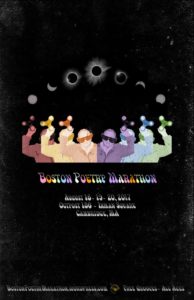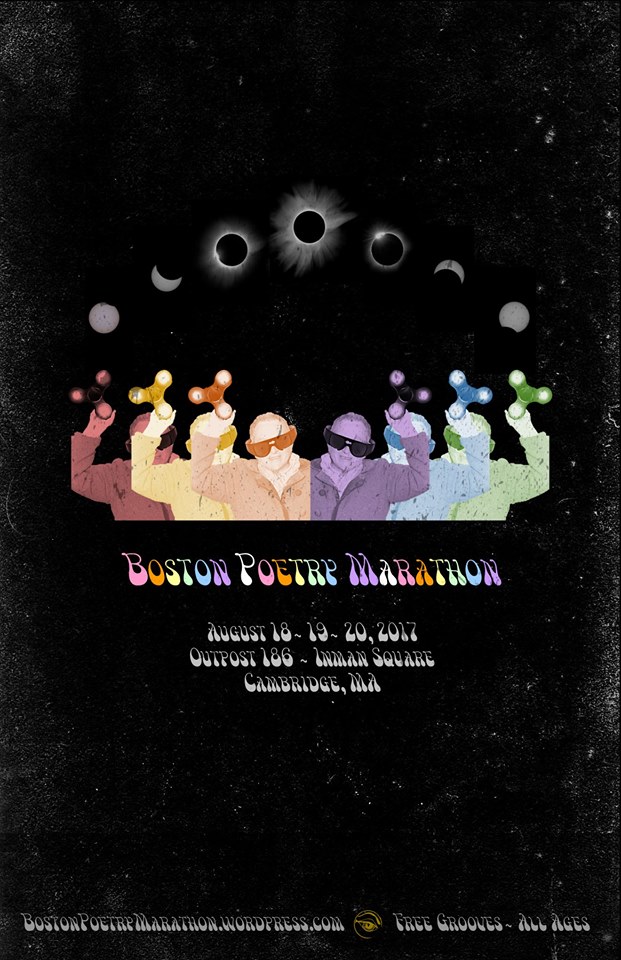 Nestled in the heart of Cambridge’s Inman Square, Outpost 186 was home to this year’s Boston Poetry Marathon, now in its twentieth year. The Outpost is a gallery space created from a hollowed-out apartment building, large enough to seat 60 people. 114 poets met Friday, August 18 through Sunday the 20th to read poetry or “talk” for eight minutes apiece. A poetry marathon is like nothing else, a deep experience of language; the varied poetic styles and performances begin to blend together into a chorus of voices. An incredible line up of regional poets read through Friday’s thunderstorm, which gave way to a hot and sunny weekend.
Nestled in the heart of Cambridge’s Inman Square, Outpost 186 was home to this year’s Boston Poetry Marathon, now in its twentieth year. The Outpost is a gallery space created from a hollowed-out apartment building, large enough to seat 60 people. 114 poets met Friday, August 18 through Sunday the 20th to read poetry or “talk” for eight minutes apiece. A poetry marathon is like nothing else, a deep experience of language; the varied poetic styles and performances begin to blend together into a chorus of voices. An incredible line up of regional poets read through Friday’s thunderstorm, which gave way to a hot and sunny weekend.
Auspiciously, this year the Boston Poetry Marathon coincided with the Boston solidarity protest march against a planned “Free Speech” rally in Washington Square on Saturday. For many poets, social justice set the tone of the weekend. Saturday opened at noon to a micro-audience of ten. Noting the lack of audience, poet Darren Black gave a nod to the “people protesting against racism” and then filled the room with his verse. Soon, there was standing room only.
Toni Bee, the first female poet elect of Cambridge, took the mic in place of Stone Soup Poetry’s Director Chad Parenteau because, she said, her “peach-skinned brother was in the march.” She told the story of how they met. Chad was trying to diversify Stone Soup and asked her what he needed to do. She said, “Choose to be uncomfortable.” Toni read a few of his poems, underscoring a poetics of, as she put it, “acting in solidarity.” She was followed by Rob Arnold who read tight, little poems with visceral, deep imagery about his time in Slingerlands, “Upstate New York.” His language was strikingly similar to Gregory Orr’s—also an upstater—with “snowfall” leading to the culminating metaphor of nature and the body: “the sky and the nest opened its throat.”
A few more readings into the day brought the over-arching themes of grief and loss, sadness, as well as contrasting warm-hearted love stories, poems protesting for women’s rights, all mixed with images of ghosts, drowning, and Catullus. (Yes, indeed. The Roman epicurean poet would become the patron saint of this year’s marathon.) The gallery pictures on the walls of Outpost 186 provided a reprieve from an abundance of language. Post-modern, post-impressionistic paintings lined the walls, each appearing unfinished, sketched in, rendering the artist’s process as it captures emotion of the scene—a kitchen space, a mountain landscape, a tree outside a blue Victorian row house and covered porch, a bend in the road in the countryside—all awash, half-filled in with non-distinct, feathered brushstrokes.
Just then, a portly man in a suit jacket burst in through the back door, his voice raised above the reader’s. He gestured to a young man in a black T-shirt and gray chinos in the audience whom brightened when he saw him. The suit clutched his briefcase and introduced two men, one of whom smelled strongly of weed. The suit said, “Let’s listen to some poetry and then decide what we should do” with an air of importance. It all lent the marathon a kind of heightened feeling like: Things are happening here, undercurrents of connections and networking and stuff. Careers are being made.
Light filtered through the trees outside the Outpost’s big bay window where the poets read beside a black lacquered upright piano. “Sarcasm is a place where you won’t die, where I won’t die,” read M.P. Carver. And Hamdi Mohammed read, ”The rug has been pulled under me.” Poems touched on love and loss, grief, trauma, activism and war. These were poems of exile, diaspora, where all poets are refugees, some from other countries, others alienated on their own soil. But whose soil is it? What is that claim? The poems were doing the important work that all poems should ideally do—to point toward something without answering, to explore the deeper questions a listener must answer on her own. And suddenly appeared the first dispatch from the field: Audrey Mardavich stepped up to the mic in her bicycle shorts, sweat still glistening on her brow. There were “a thousand Nazis and fifteen to twenty thousand of us,” she said and then began her poems about distance and attempting to achieve mutuality in relationships. Although steeped in the topic of human foibles, the poems in the early afternoon raised the fundamental questions of humanity and being in the world.
Late afternoon had poets scrambling to find the right words for the atmosphere. Wendy Mnookin, while sitting outside during the break, scrapped her planned reading list to, as she put it to “lighten things up.” She said, “I’ll read some poems about my mother, and that’s heavy enough for now.” She quickly thumbed through her books to find the right selection, amongst them the ornamental, alliterative lines eerily resonant with the current U.S. political climate: “smoke shreds/filigree, fancy, or fact/lacy words.” Back inside, a woman in the audience furiously edited her poems before her performance. Here, nothing was perfect, all poems are in process.
The room was a think-tank packed with fifty or more great poetic minds coming together as a kind of universal mind. Their creative, spontaneous energy saturated the space. A woman in black, Adeena Karasick walked up to the mic, and with a sacramental nod to current affairs, said her concern is with the “riot that exists within language itself.” Her poems, she said, were just “checking in, basically,” and then she launched into a Beat-like diatribe of sound poetry, lifting along syllables and rushing through language like a wave. Women here were writing from a place of the body—but what makes the exploration of the risks of love and invisibility new, fresh?
More dispatches from the protest came in waves. What the audience gathered from these brief stories at the mic was that the protest had ended by 2p.m., effectively called off as ‘the rally that never was.’ But before the police declared it over, a group of “free speech” rally goers were holed up in the Washington veranda, flanked on all sides by protesters hailing from Massachusetts and beyond. Not one poet reported a violent protest, and no one came back to the marathon in fear or anger. From all accounts, protesters were proud of their activism and the peaceable turnout. It was a perceived victory for the poets.
After the dinner break, a young woman in her 20s stopped in Outpost 186’s garden. She did not go into the reading. She was distraught and shaken. She told the story: “At dinner, I raised a toast to us. And then she told me, ‘You are so lovely, but you don’t have to try so hard to be liked.’ And then all the ladies agreed and laughed at me.’” But the young woman was proud of herself. She replied, “I’m in the presence of twelve women poets in the generosity of this community. I made a toast out of feelings I genuinely have. I am grateful to be here with what I consider to be my people.” In order to bring in diversity, Toni Bee said you have to choose to be uncomfortable, to make space for people unlike you. She meant the brown brothers and sisters, the red, the yellow, and the peach-colored peoples. She might have also meant the young and the old, or any and all outsiders to the in-group.
Saturday’s marathon was reaching the last few miles. By this point in the day, the word “ghost” had come up more than a handful of times, and in this segment, three readers gave a different treatment to the image. The poetry marathon experience is unique unto itself, as poems begin to speak to one another, shaping into different questions and different understandings. Maria Damon wrote, “into the dirt-drowned ghost…the slippery ellipses of bursting surfaces.” J.D. Debris described a “protest singer” “looking off into the distance at something only his glass eye could see.” His elegy was a kind of ghosting, bring the dead back to life in memory. Adam Tedesco wrote of “a ghosted thought,” and a little later, Suzanne Mercury read about the “ghosts of mice and alchemists.” Do ghosts and invisibility speak about place? about power? Poets claimed autonomy of voice with language at the same time writing about the space unoccupied, disembodied from the place of a watcher, and observer.
The poets’ words, and the repetition thereof, can defeat the past, turn back time, make one rise in reverence to the body, investing soul into the ghost, visibility where there was not, infusing selfhood into the liminal gap, the ghosting wayfarer that is flesh, bone to see those appendages in wholeness, of solid mass. And then, to use that embodiment to effect positive action. As the poet Molly McGuire put it, “answer cat calls with farts.”
On Sunday, the marathon was still blazing forward, the protest merely a passing thought. The man in the suit pulled poets into a hidden room for the Unbinding Prometheus Project to read and discuss a section of Walt Whitman’s “Song of Myself” for the bicentennial of his birthday. Many of these internal issues quieted; all those quibbles died down to erasures. Poets greeted one another warmly, exchanged numbers and Facebook profiles, and promised to keep in touch.






